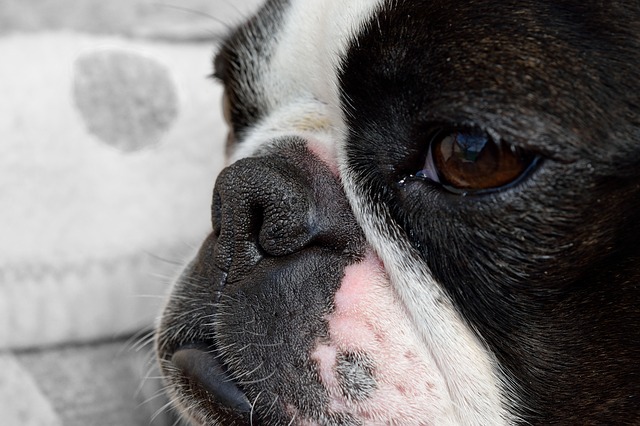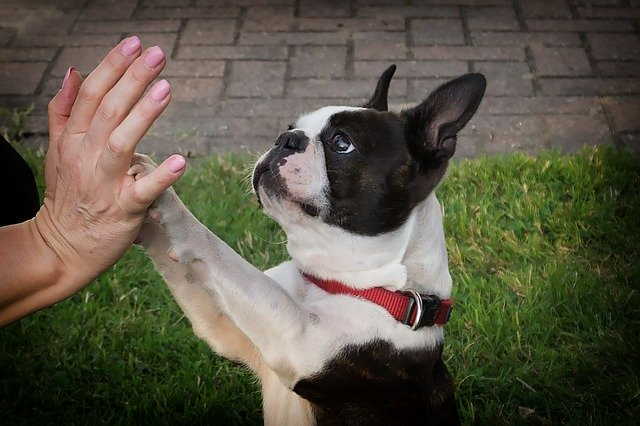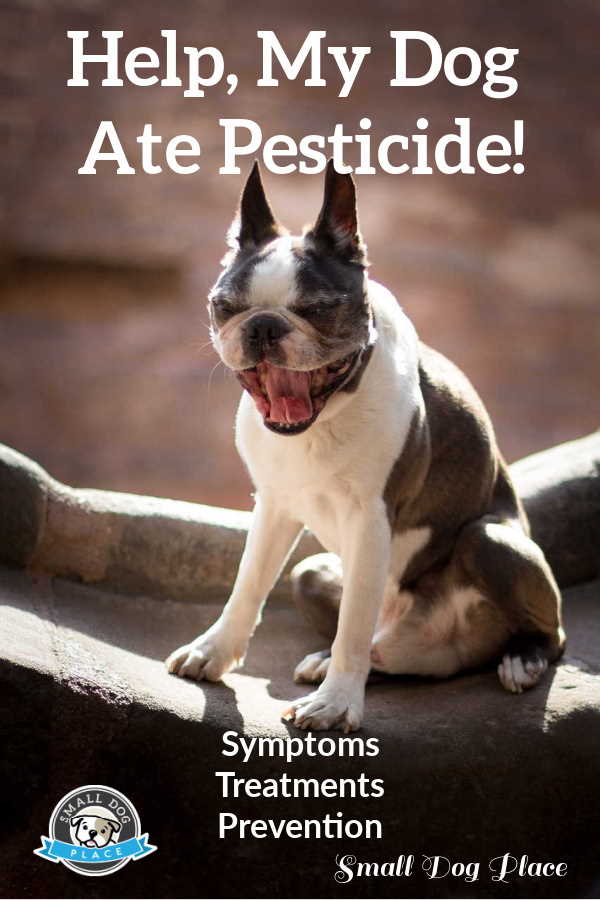Help! My Dog Ate Pesticide: 5 Signs Your Dog Consumed Pesticides
Dog Ate Pesticide By Amy Norton |Published 11-22-2021
We all know that pesticides are not healthy to consume and that certainly goes for our dogs too!
I learned this the hard way last year when my Boston Terrier, Nickel, accidentally ate pesticide.
 If Your Dog Ate Pesticide, please keep reading
If Your Dog Ate Pesticide, please keep readingWe were having problems with ants indoors and had a pest control technician over to assess our home for treatment options. We let the technician know that we had a dog, who is particularly prone to getting into things, and needed some safer alternatives to get rid of the ants. He left that day after going over a few options with us and said nothing about having started the pesticide treatment.
Later that night, we discovered that he had put two ant bait stations out - just sitting on the floor - and Nickel had already consumed the majority of one. He didn’t let us know that he had treated anything yet and had just left two sitting on the floor, which were easy for Nickel to find and get into. Needless to say, we never used this particular company again!
Act Quickly
 Act Quickly if Your Dog Ate Pesticide
Act Quickly if Your Dog Ate PesticideWe immediately looked up numbers for pet poison control, as it was past closing time at our veterinary office. Nickel was not showing any signs of distress yet, but we were concerned since she had consumed nearly a full ant bait bar.
It’s important to seek help quickly. If your veterinary office is closed, it’s recommended by the National Pesticide Information Center to immediately call one of these help lines:
ASPCA Animal Poison Control Center - 1-888-426-4435 ($65.00 credit card fee)
Pet Poison Helpline - 1-800-213-6680 ($49.00 credit card fee)
 Help MY Dog Ate Pesticide
Help MY Dog Ate PesticideNickel weighs 22 pounds and we were very concerned that her smaller size would make her more vulnerable to any adverse effect, which is why we also left a message on her vet’s after hours phone line.
If possible have the name of the pesticide, approximate amount consumed, concentration of the pesticide, and any other information on the packaging ready for the operator. In our case, the ant bait had some remaining packaging on it. We weren’t able to read the ant bait station that Nickel ate part of, but upon locating the other one we read off the information to the operator.
If the pesticide was sprayed or doesn’t have packaging, check your service order for the treatment. Per the Federal Insecticide, Fungicide, and Rodenticide Act in the United States, any treatments used must be listed with specific details on the chemicals, concentrations, etc.
How Do I Know My Dog Consumed Pesticide?
Signs of pesticide poisoning are usually quick to show up. It’s crucial that you act quickly as pesticide poisoning can usually be treated.
Within 15 minutes, you may notice your dog is:
- Restless or agitated
- Crying or whimpering
- Itchy - possibly trying to bite or roll around on their back
 Know what the signs of pesticide poisoning
Know what the signs of pesticide poisoningWithin an hour, you may notice your dog experiencing the following:
- Throwing up or diarrhea
- Gagging or trying to clear their throat
- Shakiness or agitation
- Drooling excessively
- Not showing interest in food or water
If you didn’t see what your dog got into, but they are showing these signs, we recommend giving your vet a call, visiting the emergency after hours vet, or calling a helpline for directions. The Veterinary Centers Of America say that pesticide poisoning is usually treatable if dealt with early on.
Pesticide Poisoning Treatment
In many cases, your vet will induce vomiting followed by activated charcoal to absorb the toxin from your dog’s intestinal tracts. The charcoal will not absorb everything, but can minimize how much pesticide is absorbed into their system.
This is typically followed by close monitoring of your pet’s condition and may require an overnight stay or hospitalization, depending on the severity. Your dog may be bathed to remove pesticide from their paws or fur. If the pesticide is unknown, your vet may perform blood work to identify the culprit.
If pesticide poisoning is not treated quickly and a significant amount was consumed, dogs can develop permanent neurological abnormalities or pass away after going into cardiac or respiratory distress. It’s crucial that you seek help quickly if you suspect your dog has consumed pesticide.
In our case, we were very lucky! Nickel had consumed most of an ant bait station, but the particular pesticide was less harmful than some and in a weak concentration. We closely watched her overnight and didn’t end up taking her into the vet until the next morning. The vet said everything looked fine, which we were immensely grateful for!
 If Your dog ate pesticide due to exterminating ant infestation beware
If Your dog ate pesticide due to exterminating ant infestation bewarePrevention
Prevention is always better than treating a future problem.
Ways to prevent your precious pup from consuming pesticides:
- Keep pesticides and chemicals up high and/or locked up. Many dogs can and will get into the cabinet under the sink or things in the garage, so make sure these are safely stored away.
- Consult with your pest control technician and vet for information on how long you should keep a dog away from a recently treated area of the home.
- Only use dog safe products on your dog. It’s tempting to use products we have on hand, but the concentration of certain products, like flea and tick products, can be too much for them.
- Read the instructions on all products used in your home or outside. Watch for warnings about safety and consumption!
- Less is more! If you’re applying pesticide products yourself, start small. You can always add more later and build upon the previous batch.
- Always double check with any professionals coming into your home or yard. Make sure they know that you have a dog and always get specific information on the products used and how to keep your dog safe.
There are many types of pesticides in our homes that we completely forget about. Keep a close eye on the following products:
- Pesticide sprayed inside or outside
- Ant, mole, gopher, rodent, and other animal bait stations
- Compost bins, which collect large amounts of mold and toxins overtime
- Fertilizers, herbicides, and any other chemicals your dog can (and will!) get into
- Flea and tick products that are applied to our dogs directly. These are not healthy for consumption and need to be carefully monitored.
 Ant extermination and your Dog Ate Pesticide
Ant extermination and your Dog Ate PesticideThis scary experience taught us a lot and we hope to never have a similar encounter!
I’m happy to report that Nickel is doing great.
If you suspect that your dog has consumed pesticide or they are showing signs of pesticide consumption, please call your vet or a helpline immediately. The faster your dog receives help, the better off they’ll be!
References and Sources of Help for This Article: Dog Ate Pesticide
American Veterinary Medical Association
National Pesticide Information Center
Dog Ate Pesticide: Author Bio
 Amy Norton
Amy NortonAmy Norton is a freelance pet and lifestyle blog post writer and the owner of Penned By Amy. She grew up with two Boston Terriers and now has her own Boston Terrier, Nickel, who is a spunky and playful dog.
Amy regularly takes Nickel to Sonics for mozzarella sticks to "pay" her for all of her help in the writing process. Amy is passionate about sharing important information about dog care and health to other dog owners through her writing, as dogs are truly part of the family to her!
Pin for Future Reference
 Help, My Dog ate Pesticide
Help, My Dog ate PesticideIf You Found this Safety Article on Dog Ate Pesticide Poisoning Helpful
About Janice (author and voice behind this site)
Having lived with dogs and cats most of her life, Janice served as a veterinary technician for ten years in Maryland and twelve years as a Shih Tzu dog breeder in Ohio.
Her education includes undergraduate degrees in Psychology with a minor in biology, Early Childhood Education, and Nursing, and a master's in Mental Health Counseling.
She is a lifelong learner, a dog lover, and passionate about the welfare of animals. Her favorite breed for over 50 years has been the Shih Tzu, but she has also lived with Poodles, Maltese, Yorkshire Terriers, Beagles, English Bulldogs, Carin Terriers, and a Cocker Spaniel.
When not writing, reading, and researching dog-related topics, she likes to spend time with her eight Shih Tzu dogs, husband, and family, as well as knitting and crocheting. She is also the voice behind Miracle Shih Tzu and Smart-Knit-Crocheting
Does This Article Deserve Your Thumbs Up?
We always appreciate your support and encouragement. Your thumbs up means so much to us. Please like this article.
If you find this page or any page on Small Dog Place Helpful, or useful in anyway, I'd love it if you would click the small heart found on the bottom right of each page.
You can also share or bookmark this page -- just click on the:

Free Monthly Newsletter
Sign Up for Our Free Newsletter and get our Free Gift to You.
my E-book, The Top 10 Mistakes People Make When Choosing a Dog (and how to avoid them)







